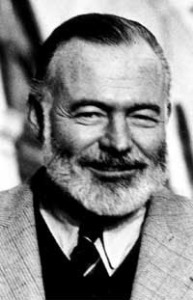 So few writers had the impact and influence Hemingway had on prose of the 20th century. Awarded the Nobel Peace Prize for Literature in 1954 for the short fiction piece, The Old Man and the Sea. His short, athletic, to-the-point style would go on to define how later writers looked at sentence construction and formatting.
So few writers had the impact and influence Hemingway had on prose of the 20th century. Awarded the Nobel Peace Prize for Literature in 1954 for the short fiction piece, The Old Man and the Sea. His short, athletic, to-the-point style would go on to define how later writers looked at sentence construction and formatting.
Married four times with the final marriage ending with his suicide, attributed to hemochromatosis. He left behind a legacy in the words of his famed characters and his globe-trotting life style. Hemingway ultimately ending up in Idaho, in the town of Ketchum.
His writings are constantly on the “greatest books” list time and time again. Many are considered classics and taught in institutes of education all over the country. With novels such as The Sun Also Rises, A Farewell To Arms, For Whom The Bell Tolls, and The Old Man and the Sea, among his best known. Also a master short fiction writer, particularly with the stories, A Clean, Well-Lighted Place and The Snows of Kilimanjaro. Hemingway set himself a part and it is this particular method of pulling from his own experiences that gave his novels and shorter fiction breath and liveliness.
As a degree holder in journalism, I’ve been directly influenced by Papa (as he like to be called, among many other names) and his short style of writing. Even though he only worked a short while at a Kansas City newspaper before traveling to Italy, and farther developing it through his many publications, the style he developed is familiar with almost every reporter in the world.
The life Hemingway lived has also had a big impact on how I see the world. He was a man’s man. Though he was known to be an introvert, such as myself, he threw himself into wild adventures. He would venture outside his comfort zone so much that he ended up almost dying in plane crashes—Twice. Consecutively.
The image that he kept around him, of the war correspondent, the deep sea fisherman, and African hunter fire the imagination. As a guy who grew up in small towns, Hemingway is larger than life. But I must remember that the time in which he wrote and lived is much different than my own. And when I do a sense of sensucht comes over me. But I feel that happens to many of my generation and it is Hemingway that triggers it for me.
Hemingway has also influenced me with my own style of writing and because of that I feel I am a stronger writer than had I not had his influence.
He’s one of the reasons I have a fascination with typewriters and enjoy working on one. The clack-clack of the keys have brought me joy since I began taking writing serious as a pastime. The use of a typewriter for short burst of writing makes me feel good once I pull the final leaf through the machine.
As the first in a series about select authors and how they have influenced me, I felt Hemingway was an obvious choice to kick off this series.
His life was full of such detail and vibrancy, even towards the end when he slowly faded into the shadows of his former glory.